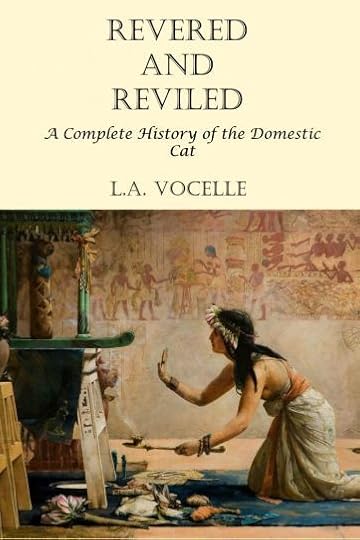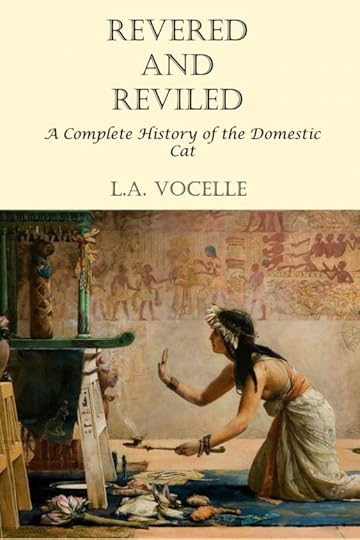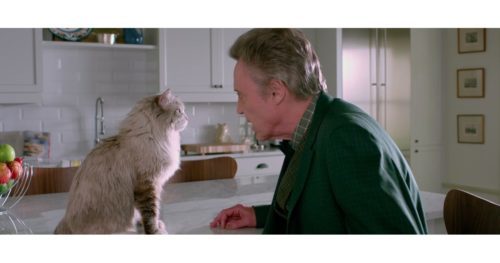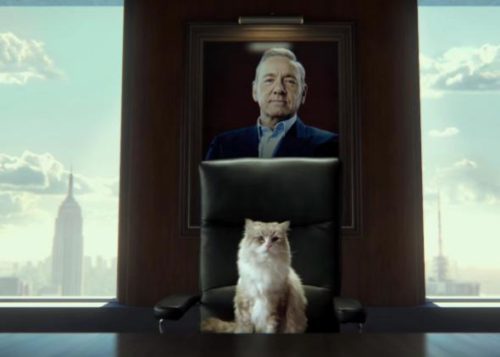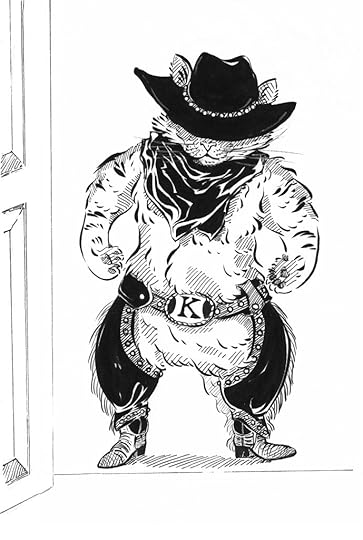L.A. Vocelle's Blog, page 3
June 24, 2019
New Cat Breed Found – The Cat Fox
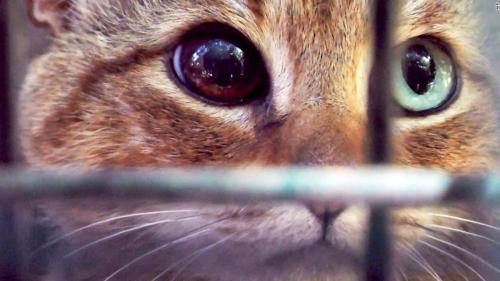 A new cat breed, called the ���chat ���renard��� or ���Cat Fox���, has recently been found on the island of Corsica. The first one was caught in a chicken coop in 2008. After realizing that this cat was different from domestic cats, wildlife experts decided that they needed to research this mysterious feline more. Spotted again in 2012 and then again in 2016 by wildlife rangers, this elusive cat���s DNA was found to be close to Felis silvestris lybica. ���By looking at its DNA, we could tell it apart from the European wildcat,��Felis silvestris silvestris. It���s close to the African forest cat,��Felis silvestris lybica, but its exact identity is still to be determined.���
A new cat breed, called the ���chat ���renard��� or ���Cat Fox���, has recently been found on the island of Corsica. The first one was caught in a chicken coop in 2008. After realizing that this cat was different from domestic cats, wildlife experts decided that they needed to research this mysterious feline more. Spotted again in 2012 and then again in 2016 by wildlife rangers, this elusive cat���s DNA was found to be close to Felis silvestris lybica. ���By looking at its DNA, we could tell it apart from the European wildcat,��Felis silvestris silvestris. It���s close to the African forest cat,��Felis silvestris lybica, but its exact identity is still to be determined.���
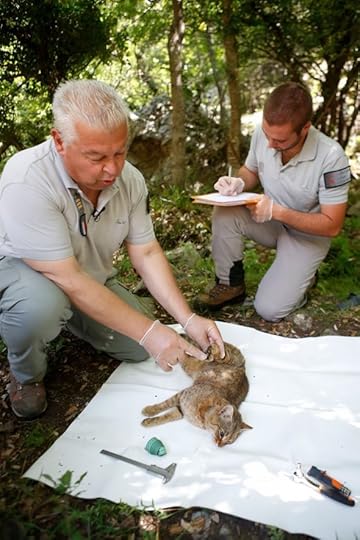
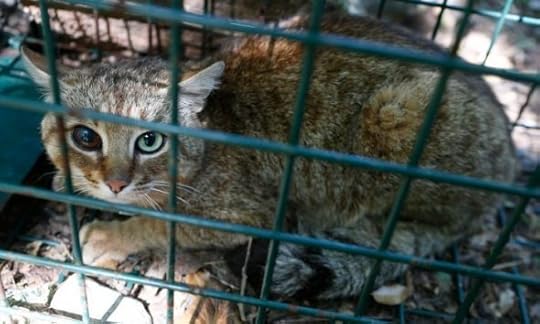
Since then, researchers have identified 16 animals ��that they believe are Cat Foxes. Twelve of them have been captured, examined, and released.
The Cat Fox is bigger than domestic cats and has a ringed tail with a black tip, measuring 90 centimeters (35 inches) head to tip compared with its domestic counterparts (76 centimeters). The cat���s features include wide set ears, short whiskers with long, canine-like teeth, and has a red-colored stomach.
Locals on the island call it ���ghjattu volpe���, ���chat-renard���, or simply ���Cat Fox���. ��Legend has it that this nocturnal cat might be responsible for attacks on goats. But there is no doubt that the mysterious creature has been prowling the French island for generations.
���We believe that it���s a wild natural species which was known but not scientifically identified because it’s an extremely inconspicuous animal with nocturnal habits,�����ONCFS environmental technician, Pierre Benedetti said.

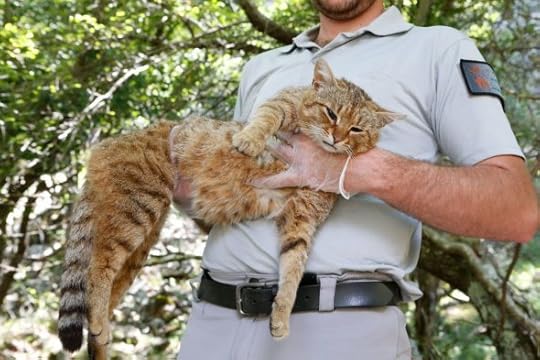
Want to know more about the cat in literature, art and history? Then Revered and Reviled is the book for�� you. Now available on Amazon in both paperback and Kindle formats.��
The post New Cat Breed Found – The Cat Fox appeared first on THE GREAT CAT.
Related posts:No related posts.
May 2, 2019
Dick Dunkerman’s Cat, Jerome K. Jerome
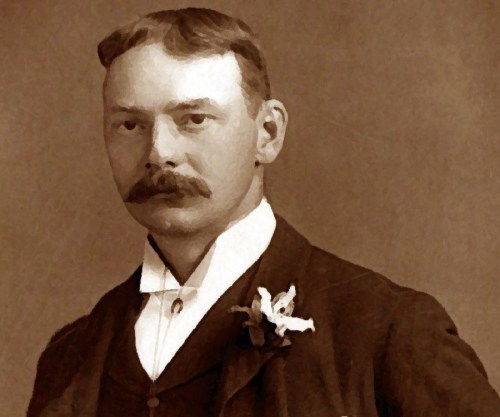 Jerome K. Jerome (1859-1927) was an English writer and cat lover. Best known for Three Men in a Boat, he, however, wrote several stories about cats or with cats in them. You can find quotes by Jerome on our quote pages.��
Jerome K. Jerome (1859-1927) was an English writer and cat lover. Best known for Three Men in a Boat, he, however, wrote several stories about cats or with cats in them. You can find quotes by Jerome on our quote pages.��
Dick Dunkerman���s Cat
Jerome K. Jerome
Richard Dunkerman and I had been old school-fellows, if a gentleman belonging to the Upper Sixth, and arriving each morning in a ���topper��� and a pair of gloves, and ���a discredit to the Lower Fourth,��� in a Scotch cap, can by any manner of means be classed together. And though in those early days a certain amount of coldness existed between us, originating in a poem, composed and sung on occasions by myself in commemoration of an alleged painful incident connected with a certain breaking-up day, and which, if I remember rightly ran:���
Dicky, Dicky, Dunk, Always in a funk, Drank a glass of sherry wine, And went home roaring drunk,
and kept alive by his brutal criticism of the same, expressed with the bony part of the knee, yet in after life we came to know and like each other better. I drifted into journalism, while he for years had been an unsuccessful barrister and dramatist; but one spring, to the astonishment of us all, he brought out the play of the season, a somewhat impossible little comedy, but full of homely sentiment and belief in human nature. It was about a couple of months after its production that he first introduced me to ���Pyramids, Esquire.���
I was in love at the time. Her name was, I think, Naomi, and I wanted to talk to somebody about her. Dick had a reputation for taking an intelligent interest in other men���s love affairs. He would let a lover rave by the hour to him, taking brief notes the while in a bulky red-covered volume labelled ���Commonplace Book.��� Of course everybody knew that he was using them merely as raw material for his dramas, but we did not mind that so long as he would only listen. I put on my hat and went round to his chambers.
We talked about indifferent matters for a quarter of an hour or so, and then I launched forth upon my theme. I had exhausted her beauty and goodness, and was well into my own feelings���the madness of my ever imagining I had loved before, the utter impossibility of my ever caring for any other woman, and my desire to die breathing her name���before he made a move. I thought he had risen to reach down, as usual, the ���Commonplace Book,��� and so waited, but instead he went to the door and opened it, and in glided one of the largest and most beautiful black tom-cats I have ever seen. It sprang on Dick���s knee with a soft ���cur-roo,��� and sat there upright, watching me, and I went on with my tale.
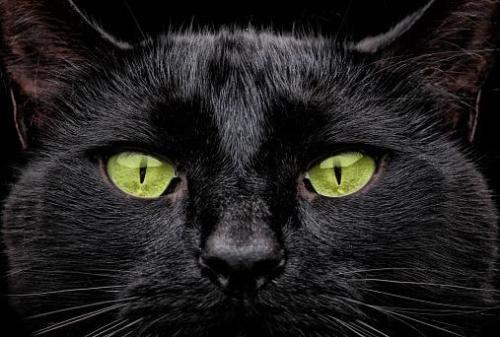
After a few minutes Dick interrupted me with:���
���I thought you said her name was Naomi?���
���So it is,��� I replied. ���Why?���
���Oh, nothing,��� he answered, ���only just now you referred to her as Enid.���
This was remarkable, as I had not seen Enid for years, and had quite forgotten her. Somehow it took the glitter out of the conversation. A dozen sentences later Dick stopped me again with:���
���Who���s Julia?���
I began to get irritated. Julia, I remembered, had been cashier in a city restaurant, and had, when I was little more than a boy, almost inveigled me into an engagement. I found myself getting hot at the recollection of the spooney rhapsodies I had hoarsely poured into her powder-streaked ear while holding her flabby hand across the counter.
���Did I really say ���Julia���?��� I answered somewhat sharply, ���or are you joking?���
���You certainly alluded to her as Julia,��� he replied mildly. ���But never mind, you go on as you like, I shall know whom you mean.���
But the flame was dead within me. I tried to rekindle it, but every time I glanced up and met the green eyes of the black Tom it flickered out again. I recalled the thrill that had penetrated my whole being when Naomi���s hand had accidentally touched mine in the conservatory, and wondered whether she had done it on purpose. I thought how good and sweet she was to that irritatingly silly old frump her mother, and wondered if it really were her mother, or only hired. I pictured her crown of gold-brown hair as I had last seen it with the sunlight kissing its wanton waves, and felt I would like to be quite sure that it were all her own.
Once I clutched the flying skirts of my enthusiasm with sufficient firmness to remark that in my own private opinion a good woman was more precious than rubies; adding immediately afterwards���the words escaping me unconsciously before I was aware even of the thought������pity it���s so difficult to tell ���em.���
Then I gave it up, and sat trying to remember what I had said to her the evening before, and hoping I had not committed myself.
Dick���s voice roused me from my unpleasant reverie.
���No,��� he said, ���I thought you would not be able to. None of them can.���
���None of them can what?��� I asked. Somehow I was feeling angry with Dick and with Dick���s cat, and with myself and most other things.
���Why talk love or any other kind of sentiment before old Pyramids here?��� he replied, stroking the cat���s soft head as it rose and arched its back.
���What���s the confounded cat got to do with it?��� I snapped.
���That���s just what I can���t tell you,��� he answered, ���but it���s very remarkable. Old Leman dropped in here the other evening and began in his usual style about Ibsen and the destiny of the human race, and the Socialistic idea and all the rest of it���you know his way. Pyramids sat on the edge of the table there and looked at him, just as he sat looking at you a few minutes ago, and in less than a quarter of an hour Leman had come to the conclusion that society would do better without ideals and that the destiny of the human race was in all probability the dust heap. He pushed his long hair back from his eyes and looked, for the first time in his life, quite sane. ���We talk about ourselves,��� he said, ���as though we were the end of creation. I get tired listening to myself sometimes. Pah!��� he continued, ���for all we know the human race may die out utterly and another insect take our place, as possibly we pushed out and took the place of a former race of beings. I wonder if the ant tribe may not be the future inheritors of the earth. They understand combination, and already have an extra sense that we lack. If in the courses of evolution they grow bigger in brain and body, they may become powerful rivals, who knows?��� Curious to hear old Leman talking like that, wasn���t it?���
���What made you call him ���Pyramids���?��� I asked of Dick.
���I don���t know,��� he answered, ���I suppose because he looked so old. The name came to me.���
I leaned across and looked into the great green eyes, and the creature, never winking, never blinking, looked back into mine, until the feeling came to me that I was being drawn down into the very wells of time. It seemed as though the panorama of the ages must have passed in review before those expressionless orbs���all the loves and hopes and desires of mankind; all the everlasting truths that have been found false; all the eternal faiths discovered to save, until it was discovered they damned. The strange black creature grew and grew till it seemed to fill the room, and Dick and I to be but shadows floating in the air.
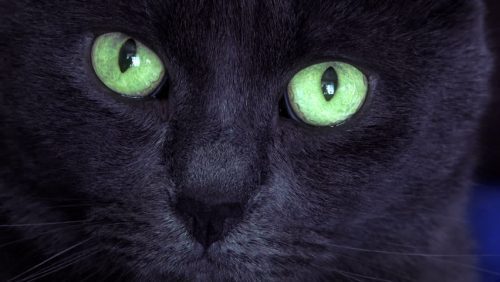
I forced from myself a laugh, that only in part, however, broke the spell, and inquired of Dick how he had acquired possession of it.
���It came to me,��� he answered, ���one night six months ago. I was down on my luck at the time. Two of my plays, on which I had built great hopes, had failed, one on top of the other���you remember them���and it appeared absurd to think that any manager would ever look at anything of mine again. Old Walcott had just told me that he did not consider it right of me under all the circumstances to hold Lizzie any longer to her engagement, and that I ought to go away and give her a chance of forgetting me, and I had agreed with him. I was alone in the world, and heavily in debt. Altogether things seemed about as hopeless as they could be, and I don���t mind confessing to you now that I had made up my mind to blow out my brains that very evening. I had loaded my revolver, and it lay before me on the desk. My hand was toying with it when I heard a faint scratching at the door. I paid no attention at first, but it grew more persistent, and at length, to stop the faint noise which excited me more than I could account for, I rose and opened the door and it walked in.
���It perched itself upon the corner of my desk beside the loaded pistol, and sat there bolt upright looking at me; and I, pushing back my chair, sat looking at it. And there came a letter telling me that a man of whose name I had never heard had been killed by a cow in Melbourne, and that under his will a legacy of three thousand pounds fell into the estate of a distant relative of my own who had died peacefully and utterly insolvent eighteen months previously, leaving me his sole heir and representative, and I put the revolver back into the drawer.���
���Do you think Pyramids would come and stop with me for a week?��� I asked, reaching over to stroke the cat as it lay softly purring on Dick���s knee.
���Maybe he will some day,��� replied Dick in a low voice, but before the answer came���I know not why���I had regretted the jesting words.
���I came to talk to him as though he were a human creature,��� continued Dick, ���and to discuss things with him. My last play I regard as a collaboration; indeed, it is far more his than mine.���
I should have thought Dick mad had not the cat been sitting there before me with its eyes looking into mine. As it was, I only grew more interested in his tale.
���It was rather a cynical play as I first wrote it,��� he went on, ���a truthful picture of a certain corner of society as I saw and knew it. From an artistic point of view I felt it was good; from the box-office standard it was doubtful. I drew it from my desk on the third evening after Pyramids��� advent, and read it through. He sat on the arm of the chair and looked over the pages as I turned them.
���It was the best thing I had ever written. Insight into life ran through every line, I found myself reading it again with delight. Suddenly a voice beside me said:���
������Very clever, my boy, very clever indeed. If you would just turn it topsy-turvy, change all those bitter, truthful speeches into noble sentiments; make your Under-Secretary for Foreign Affairs (who never has been a popular character) die in the last act instead of the Yorkshireman, and let your bad woman be reformed by her love for the hero and go off somewhere by herself and be good to the poor in a black frock, the piece might be worth putting on the stage.���
���I turned indignantly to see who was speaking. The opinions sounded like those of a theatrical manager. No one was in the room but I and the cat. No doubt I had been talking to myself, but the voice was strange to me.
������Be reformed by her love for the hero!��� I retorted, contemptuously, for I was unable to grasp the idea that I was arguing only with myself, ���why it���s his mad passion for her that ruins his life.���
������And will ruin the play with the great B.P.,��� returned the other voice. ���The British dramatic hero has no passion, but a pure and respectful admiration for an honest, hearty English girl���pronounced ���gey-url.��� You don���t know the canons of your art.���
������And besides,��� I persisted, unheeding the interruption, ���women born and bred and soaked for thirty years in an atmosphere of sin don���t reform.���
������Well, this one���s got to, that���s all,��� was the sneering reply, ���let her hear an organ.���
������But as an artist -,��� I protested.
������You will be always unsuccessful,��� was the rejoinder. ���My dear fellow, you and your plays, artistic or in artistic, will be forgotten in a very few years hence. You give the world what it wants, and the world will give you what you want. Please, if you wish to live.���
���So, with Pyramids beside me day by day, I re-wrote the play, and whenever I felt a thing to be utterly impossible and false I put it down with a grin. And every character I made to talk clap-trap sentiment while Pyramids purred, and I took care that everyone of my puppets did that which was right in the eyes of the lady with the lorgnettes in the second row of the dress circle; and old Hewson says the play will run five hundred nights.
���But what is worst,��� concluded Dick, ���is that I am not ashamed of myself, and that I seem content.���
���What do you think the animal is?��� I asked with a laugh, ���an evil spirit���? For it had passed into the next room and so out through the open window, and its strangely still green eyes no longer drawing mine towards them, I felt my common sense returning to me.
���You have not lived with it for six months,��� answered Dick quietly, ���and felt its eyes for ever on you as I have. And I am not the only one. You know Canon Whycherly, the great preacher?���
���My knowledge of modern church history is not extensive,��� I replied. ���I know him by name, of course. What about him?���
���He was a curate in the East End,��� continued Dick, ���and for ten years he laboured, poor and unknown, leading one of those noble, heroic lives that here and there men do yet live, even in this age. Now he is the prophet of the fashionable up-to-date Christianity of South Kensington, drives to his pulpit behind a pair of thorough-bred Arabs, and his waistcoat is taking to itself the curved line of prosperity. He was in here the other morning on behalf of Princess —. They are giving a performance of one of my plays in aid of the Destitute Vicars��� Fund.���
���And did Pyramids discourage him?��� I asked, with perhaps the suggestion of a sneer.
���No,��� answered Dick, ���so far as I could judge, it approved the scheme. The point of the matter is that the moment Whycherly came into the room the cat walked over to him and rubbed itself affectionately against his legs. He stood and stroked it.���
������Oh, so it���s come to you, has it?��� he said, with a curious smile.
���There was no need for any further explanation between us. I understood what lay behind those few words.���
I lost sight of Dick for some time, though I heard a good deal of him, for he was rapidly climbing into the position of the most successful dramatist of the day, and Pyramids I had forgotten all about, until one afternoon calling on an artist friend who had lately emerged from the shadows of starving struggle into the sunshine of popularity, I saw a pair of green eyes that seemed familiar to me gleaming at me from a dark corner of the studio.
���Why, surely,��� I exclaimed, crossing over to examine the animal more closely, ���why, yes, you���ve got Dick Dunkerman���s cat.���
He raised his face from the easel and glanced across at me.
���Yes,��� he said, ���we can���t live on ideals,��� and I, remembering, hastened to change the conversation.
Since then I have met Pyramids in the rooms of many friends of mine. They give him different names, but I am sure it is the same cat, I know those green eyes. He always brings them luck, but they are never quite the same men again afterwards.
Sometimes I sit wondering if I hear his scratching at the door.
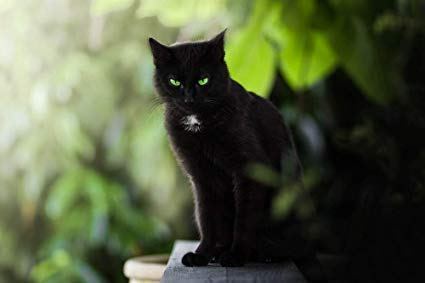
Want to know more about the cat in history, art and literature? Then Revered and Reviled is the book for you. Now available on Amazon in both paperback and Kindle formats.��
The post Dick Dunkerman’s Cat, Jerome K. Jerome appeared first on THE GREAT CAT.
Related posts:No related posts.
March 8, 2019
Freddie Mercury (born Farrokh Bulsara 1946 – 1991, British-Zanzibari)
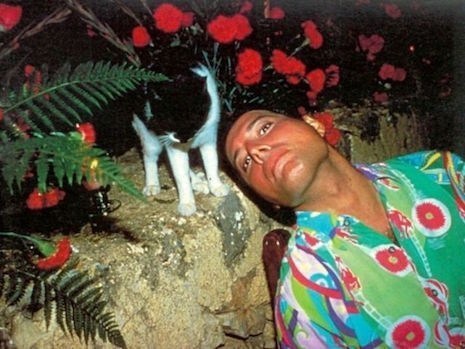
Freddie Mercury with Delilah
Freddie Mercury (born Farrokh Bulsara 1946 – 1991, British-Zanzibari) is one of the most famous pop-rock singers in the world. Born in Zanzibar to Indian-parsi parents who immigrated to Britain in 1964, he began studying music at a young age in India. After moving to Britain, he studied art at Isleworth Polytechnic in West London and graphic art and design at Ealing Art College graduating with a diploma in 1969, one year before he formed the band Queen in 1970. Mercury designed the logo for Queen and also chose the name “Queen” for the new band. He later said, “It’s very regal obviously, and it sounds splendid. It’s a strong name, very universal and immediate. I was certainly aware of the gay connotations, but that was just one facet of it.” At about the same time, he legally changed his surname, Bulsara, to Mercury.
Mercury was described as being the “best virtuoso rock ‘n’ roll singer of all time” by Who’s lead singer Roger Daltrey. Mercury had an amazing range and could change his style. Over the years, Mercury performed approximately 700 concerts around the world. He also wrote more than half of Queen’s greatest hits and was posthumously inducted into the Rock ‘n’ Roll Hall of Fame as well as the Song Writer’s Hall of Fame.
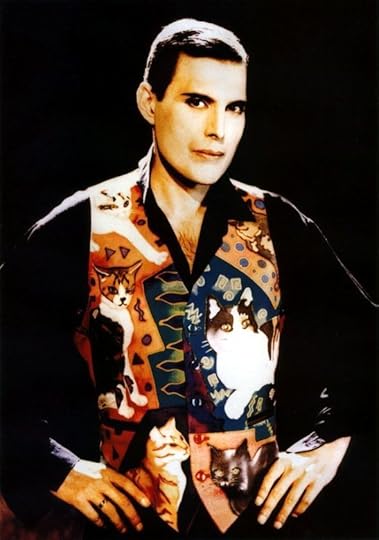
Freddie Mercury wearing Cat Vest
At about the same time that Mercury started the group Queen, he met Mary Austin, who was to become his life long friend and lover. Even though Mercury formed other relationships, he maintained his close friendship with Austin and bequeathed her and his cats most of his estate upon his death. In a 1985 interview, Mercury said of Austin, “All my lovers asked me why they couldn’t replace Mary [Austin], but it’s simply impossible. The only friend I’ve got is Mary, and I don’t want anybody else. To me, she was my common-law wife. To me, it was a marriage. We believe in each other, that’s enough for me.” It was Austin who introduced Mercury to cats.
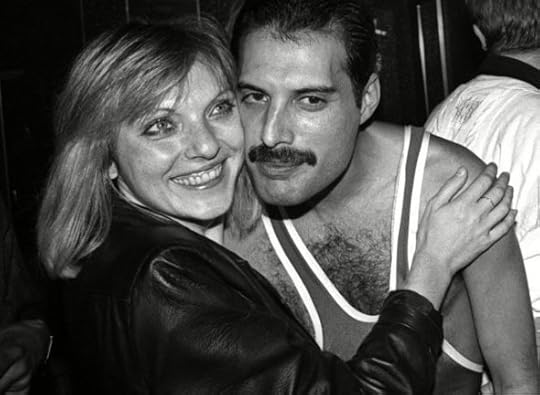
Mary Austin and Freddie Mercury
Perhaps Mercury can be called “rock’s greatest lover of cats” since his love of cats is renown. His first two cats, Tom and Jerry, given to him by Austin were the beginning of a long devoted relationship with cats. His London residence was soon filled with up to 10 cats, each with their own bedrooms. The eccentric Mercury often called home to check on his feline loves. His personal assistant, Peter Freestone stated, “He’d get to a hotel, we’d dial through, and he really would talk to his cats.” Freestone explained, “Mary would hold Tom and Jerry in turn up to the receiver to listen to Freddie talking. This continued throughout the years with succeeding feline occupants of his houses.”
Mercury’s cats Tiffany (a Blue Point given to him by Mary), Dorothy, Delilah, Goliath, Lily, Miko, Oscar and Romeo were his family, so much so that he insisted that each Christmas they be given their own Christmas stockings filled with kitty treats. Mercury loved rescuing cats from the Blue Cross shelter. This included Goliath (a small black cat who liked to sleep in the bathroom washbasin), Miko (black and white – mainly black), Romeo (tabby and white), Lilly (black and white – mainly white, a Turkish Van type cat) and Oscar (an orange-and-white Tom who came to live with him via his partner Jim Hutton).

Freddie Mercury’s Cat Goliath in Sink
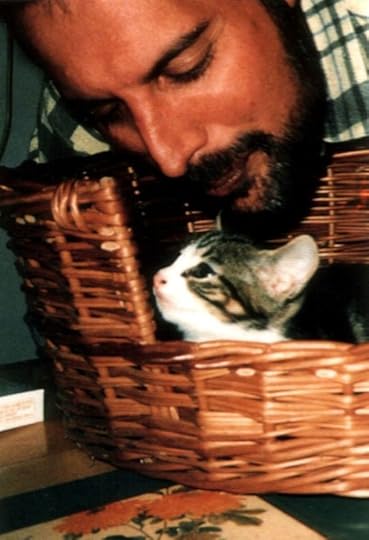
Freddie Mercury Romeo

Freddie Mercury and Cat
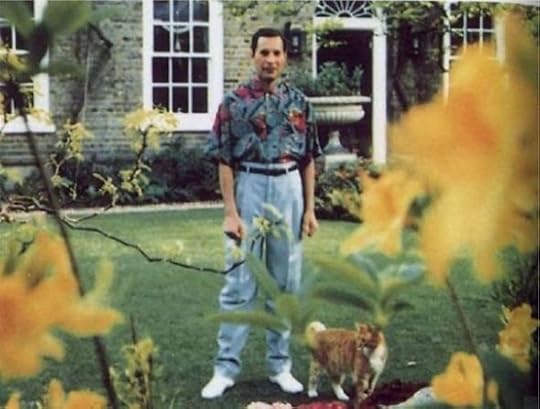
Freddie Mercury and Oscar
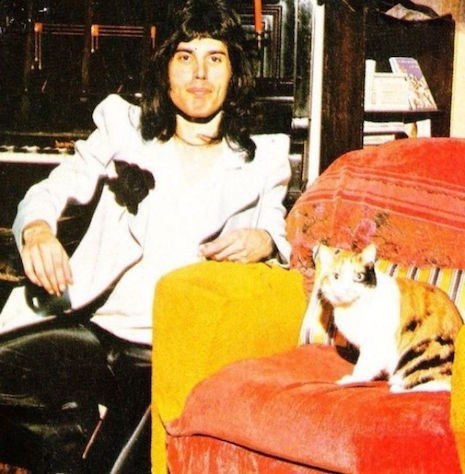
Freddie Mercury with Jerry
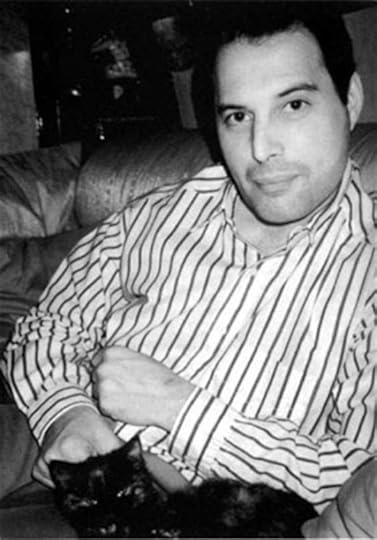
Freddie Mercury with Miko
Jim Hutton, his last companion, wrote, “He would constantly fuss over them, and if any of them came to any harm when Freddie was away, heaven help us. During the day the cats had the run of the house and grounds, and at night one of us would round them up and bring them inside.” Once when Goliath disappeared Hutton remembers, “Freddie became frantic, and in deep despair he hurled a beautiful Japanese hibachi [grill] through the window of the guest bedroom.” When Goliath was found, “Freddie was over the moon. . . For five minutes or more he poured his attention on the kitten, cuddling and stroking him. Then, like a mother, Freddie scolded the cat, shouting and screaming at tiny Goliath for leaving Garden Lodge. The dark ball of fur just sat there, listening calmly to Freddie’s outburst and purring loudly.”
Mercury loved his cats so much that in 1985, he dedicated his solo album Mr. Bad Guy “to my cat Jerry—also Tom, Oscar, and Tiffany, and all the cat lovers across the universe—screw everybody else!”

Freddie Mercury and Tiffany

Freddie Mercury with Oscar and Tiffany
However, it was his calico cat Delilah whom he got in 1987, “the little princess”, that stole Mercury’s heart. Hutton recalls that Delilah was “the one he’d pick up and stroke the most often. . . . She’d sleep at the foot of the bed, before slipping out for a nighttime prowl… Delilah was a spoilt cat and depended on Freddie for everything, even protection from the other cats. They would gang up on her and she would run into our bedroom—it was a cat sanctuary. In many ways the cats were Freddie’s children, and we all thought of them that way. The slightest feline sneeze or twitch and he’d send them off to the vet for a check-up…”

Delilah Freddie Mercury’s Favorite
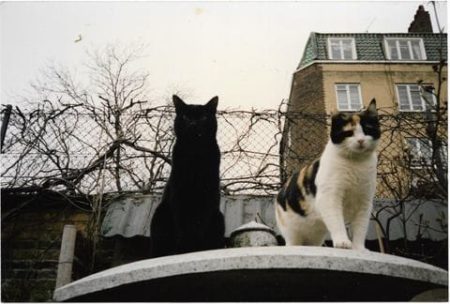
Delilah and Goliath
It was to Delilah that he wrote the song of the same name for even though his band mate Roger Taylor hated it. The song appeared on the album Innuendo, the last one to be released while Mercury was alive. The cover of the album had a photo of Mercury with a cat sitting on each of his shoulders and another on the top of his head.

Mercury was diagnosed with AIDS in late 1987, and on 24 November 1991, Mercury died at the age of 45 at his home in Kensington. One of his last actions was to pet Delilah.

Freddie with Delilah and Miko
The film Bohemian Rhapsody (2018) is the highest grossing musical biopic of all time. Rami Malek won an Oscar for Best Actor for his portrayal of Freddie Mercury.
Want to know more about the cat in history, art and literature? Then Revered and Reviled is the book for you. Now available on Amazon in both paperback and Kindle formats.
The post Freddie Mercury (born Farrokh Bulsara 1946 – 1991, British-Zanzibari) appeared first on THE GREAT CAT.
Related posts:No related posts.
Freddie Mercury (born Farrokh Bulsara 1946 ��� 1991, British-Zanzibari)

Freddie Mercury with Delilah
Freddie Mercury��(born��Farrokh Bulsara 1946 ��� 1991, British-Zanzibari) is one of the most famous pop-rock singers in the world. Born in Zanzibar to Indian-parsi parents who immigrated to Britain in 1964, he began studying music at a young age in India. After moving to Britain, he studied art at Isleworth Polytechnic in West London and graphic art and design at Ealing Art College graduating with a diploma in 1969, one year before he formed the band Queen in 1970. Mercury designed the logo for Queen and also chose the name “Queen” for the new band. He later said, “It’s very regal obviously, and it sounds splendid. It’s a strong name, very universal and immediate. I was certainly aware of the gay connotations, but that was just one facet of it.”�� ��At about the same time, he legally changed his surname, Bulsara, to Mercury.
Mercury was described as being the ���best virtuoso rock ���n��� roll singer of all time��� by Who���s lead singer Roger Daltrey. Mercury had an amazing range and could change his style. Over the years, Mercury performed approximately 700 concerts around the world. He also wrote more than half of Queen���s greatest hits and was posthumously inducted into the Rock ���n��� Roll Hall of Fame as well as the Song Writer���s Hall of Fame.

Freddie Mercury wearing Cat Vest
At about the same time that Mercury started the group Queen, he met Mary Austin, who was to become his life long friend and lover. Even though Mercury formed other relationships, he maintained his close friendship with Austin and bequeathed her and his cats most of his estate upon his death. In a 1985 interview, Mercury said of Austin, “All my lovers asked me why they couldn’t replace Mary [Austin], but it’s simply impossible. The only friend I’ve got is Mary, and I don’t want anybody else. To me, she was my common-law wife. To me, it was a marriage. We believe in each other, that’s enough for me.” It was Austin who introduced Mercury to cats.

Mary Austin and Freddie Mercury
Perhaps Mercury can be called ���rock���s greatest lover of cats��� since his love of cats is renown. His first two cats, Tom and Jerry, given to him by Austin were the beginning of a long devoted relationship with cats. His London residence was soon filled with up to 10 cats, each with their own bedrooms. The eccentric Mercury often called home to check on his feline loves. His personal assistant, Peter Freestone stated, ���He���d get to a hotel, we���d dial through, and he really would talk to his cats.��� Freestone explained, ���Mary would hold Tom and Jerry in turn up to the receiver to listen to Freddie talking. This continued throughout the years with succeeding feline occupants of his houses.���
Mercury���s cats Tiffany (a Blue Point given to him by Mary), Dorothy, Delilah, Goliath, Lily, Miko, Oscar and Romeo were his family, so much so that he insisted that each Christmas they be given their own Christmas stockings filled with kitty treats. Mercury loved rescuing cats from the Blue Cross shelter. This included Goliath (a small black cat who liked to sleep in the bathroom washbasin), Miko (black and white ��� mainly black), Romeo (tabby and white), Lilly (black and white ��� mainly white, a Turkish Van type cat) and Oscar (an orange-and-white Tom who came to live with him via his partner Jim Hutton).

Freddie Mercury’s Cat Goliath in Sink

Freddie Mercury Romeo

Freddie Mercury and Cat

Freddie Mercury and Oscar

Freddie Mercury with Jerry

Freddie Mercury with Miko
��Jim Hutton, his last companion, wrote, ���He would constantly fuss over them, and if any of them came to any harm when Freddie was away, heaven help us. During the day the cats had the run of the house and grounds, and at night one of us would round them up and bring them inside.����� Once when Goliath disappeared Hutton remembers, ���Freddie became frantic, and in deep despair he hurled a beautiful Japanese hibachi [grill] through the window of the guest bedroom.��� When Goliath was found, ���Freddie was over the moon. . . For five minutes or more he poured his attention on the kitten, cuddling and stroking him. Then, like a mother, Freddie scolded the cat, shouting and screaming at tiny Goliath for leaving Garden Lodge. The dark ball of fur just sat there, listening calmly to Freddie���s outburst and purring loudly.���
Mercury loved his cats so much that in 1985, he dedicated his solo album��Mr. Bad Guy�����to my cat Jerry���also Tom, Oscar, and Tiffany, and all the cat lovers across the universe���screw everybody else!�����

Freddie Mercury and Tiffany

Freddie Mercury with Oscar and Tiffany
However, it was his calico cat Delilah whom he got in 1987, ���the little princess���, that stole Mercury���s heart. Hutton recalls that Delilah was ���the one he���d pick up and stroke the most often. . . . She���d sleep at the foot of the bed, before slipping out for a nighttime prowl��� ��Delilah was a spoilt cat and depended on Freddie for everything, even protection from the other cats. They would gang up on her and she would run into our bedroom���it was a cat sanctuary. In many ways the cats were Freddie���s children, and we all thought of them that way. The slightest feline sneeze or twitch and he���d send them off to the vet for a check-up������

Delilah Freddie Mercury’s Favorite

Delilah and Goliath
It was to Delilah that he wrote the song of the same name for even though his band mate Roger Taylor hated it. The song appeared on the album Innuendo, the last one to be released while Mercury was alive. The cover of the album had a photo of Mercury with a cat sitting on each of his shoulders and another on the top of his head.

Mercury was diagnosed with AIDS in late 1987, and on 24 November 1991, Mercury died at the age of 45 at his home in Kensington. One of his last actions was to pet Delilah.

Freddie with Delilah and Miko
The film Bohemian Rhapsody (2018) is the highest grossing musical biopic of all time. Rami Malek won an Oscar for Best Actor for his portrayal of Freddie Mercury.
Want to know more about the cat in history, art and literature? Then Revered and Reviled is the book for you. Now available on Amazon in both paperback and Kindle formats.��
The post Freddie Mercury (born Farrokh Bulsara 1946 ��� 1991, British-Zanzibari) appeared first on THE GREAT CAT.
Related posts:
No related posts.
February 1, 2019
The Cats of Ulthar

THE CATS OF ULTHAR
H.P. LOVECRAFT
1920
It is said that in Ulthar, which lies beyond the river Skai, no man may kill a cat; and this I can verily believe as I gaze upon him who sitteth purring before the fire. For the cat is cryptic, and close to strange things which men cannot see. He is the soul of antique Aegyptus, and bearer of tales from forgotten cities in Meroe and Ophir. He is the kin of the jungles lords, and heir to the secrets of hoary and sinister Africa. The Sphinx is his cousin, and he speaks her language; but he is more ancient than the Sphinx, and remembers that which she hath forgotten.
In Ulthar, before ever the burgesses forbade the killing of cats, there dwelt an old cotter and his wife who delighted to trap and slay the cats of their neighbors. Why they did this I know not; save that many hate the voice of the cat in the night, and take it ill that cats should run stealthily about yards and gardens at twilight. But whatever the reason, this old man and woman took pleasure in trapping and slaying every cat which came near to their hovel; and from some of the sounds heard after dark, many villagers fancied that the manner of slaying was exceedingly peculiar. But the villagers did not discuss such things with the old man and his wife; because of the habitual expression on the withered faces of the two, and because their cottage was so small and so darkly hidden under spreading oaks at the back of a neglected yard. In truth, much as the owners of cats hated these odd folk, they feared them more; and instead of berating them as brutal assassins, merely took care that no cherished pet or mouser should stray toward the remote hovel under the dark trees. When through some unavoidable oversight a cat was missed, and sounds heard after dark, the loser would lament impotently; or console himself by thanking Fate that it was not one of his children who had thus vanished. For the people of Ulthar were simple, and knew not whence it is all cats first came.
One day a caravan of strange wanderers from the South entered the narrow cobbled streets of Ulthar. Dark wanderers they were, and unlike the other roving folk who passed through the village twice every year. In the market-place they told fortunes for silver, and bought gay beads from the merchants. What was the land of these wanderers none could tell; but it was seen that they were given to strange prayers, and that they had painted on the sides of their wagons strange figures with human bodies and the heads of cats, hawks, rams and lions. And the leader of the caravan wore a headdress with two horns and a curious disk betwixt the horns.
There was in this singular caravan a little boy with no father or mother, but only a tiny black kitten to cherish. The plague had not been kind to him, yet had left him this small furry thing to mitigate his sorrow; and when one is very young, one can find great relief in the lively antics of a black kitten. So the boy whom the dark people called Menes smiled more often than he wept as he sat playing with his graceful kitten on the steps of an oddly painted wagon.
On the third morning of the wanderers stay in Ulthar, Menes could not find his kitten; and as he sobbed aloud in the market-place certain villagers told him of the old man and his wife, and of sounds heard in the night. And when he heard these things his sobbing gave place to meditation, and finally to prayer. He stretched out his arms toward the sun and prayed in a tongue no villager could understand; though indeed the villagers did not try very hard to understand, since their attention was mostly taken up by the sky and the odd shapes the clouds were assuming. It was very peculiar, but as the little boy uttered his petition there seemed to form overhead the shadowy, nebulous figures of exotic things; of hybrid creatures crowned with horn-flanked disks. Nature is full of such illusions to impress the imaginative.
That night the wanderers left Ulthar, and were never seen again. And the householders were troubled when they noticed that in all the village there was not a cat to be found. From each hearth the familiar cat had vanished; cats large and small, black, grey, striped, yellow and white. Old Kranon, the burgomaster, swore that the dark folk had taken the cats away in revenge for the killing of Menes kitten; and cursed the caravan and the little boy. But Nith, the lean notary, declared that the old cotter and his wife were more likely persons to suspect; for their hatred of cats was notorious and increasingly bold. Still, no one durst complain to the sinister couple; even when little Atal, the innkeepers son, vowed that he had at twilight seen all the cats of Ulthar in that accursed yard under the trees, pacing very slowly and solemnly in a circle around the cottage, two abreast, as if in performance of some unheard- of rite of beasts. The villagers did not know how much to believe from so small a boy; and though they feared that the evil pair had charmed the cats to their death, they preferred not to chide the old cotter till they met him outside his dark and repellent yard.
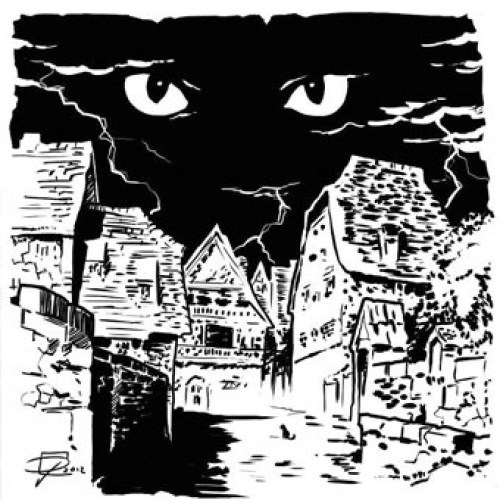
So Ulthar went to sleep in vain anger; and when the people awakened at dawn behold! every cat was back at his accustomed hearth! Large and small, black, grey, striped, yellow and white, none was missing. Very sleek and fat did the cats appear, and sonorous with purring content. The citizens talked with one another of the affair, and marveled not a little. Old Kranon again insisted that it was the dark folk who had taken them, since cats did not return alive from the cottage of the ancient man .and his wife. But all agreed on one thing: that the refusal of all the cats to eat their portions of meat or drink their saucers of milk was exceedingly curious. And for two whole days the sleek, lazy cats of Ulthar would touch no food, but only doze by the fire or in the sun.
It was fully a week before the villagers noticed that no lights were appearing at dusk in the windows of the cottage under the trees. Then the lean Nith remarked that no one had seen the old man or his wife since the night the cats were away. In another week the burgomaster decided to overcome his fears and call at the strangely silent dwelling as a matter of duty, though in so doing he was careful to take with him Shang the blacksmith and Thul the cutter of stone as witnesses. And when they had broken down the frail door they found only this: two cleanly picked human skeletons on the earthen floor, and a number of singular beetles crawling in the shadowy corners.

There was subsequently much talk among the burgesses of Ulthar. Zath, the coroner, disputed at length with Nith, the lean notary; and Kranon and Shang and Thul were overwhelmed with questions. Even little Atal, the innkeepers son, was closely questioned and given a sweetmeat as reward. They talked of the old cotter and his wife, of the caravan of dark wanderers, of small Menes and his black kitten, of the prayer of Menes and of the sky during that prayer, of the doings of the cats on the night the caravan left, and of what was later found in the cottage under the dark trees in the repellent yard.
And in the end the burgesses passed that remarkable law which is told of by traders in Hatheg and discussed by travelers in Nir; namely, that in Ulthar no man may kill a cat.
The post The Cats of Ulthar appeared first on THE GREAT CAT.
Related posts:
No related posts.
January 14, 2017
Cats in Film – A Street Cat Named Bob (2016)
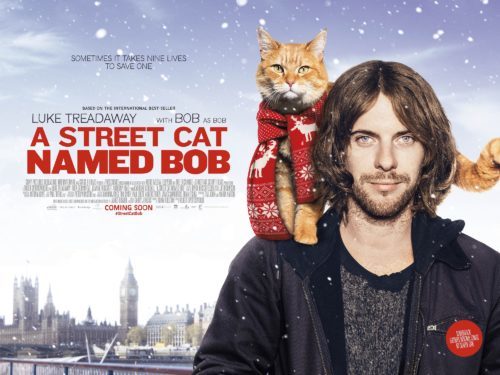 The 2016 film A Street Cat Named Bob recounts the life of James Bowen as a recovering heroin addict. While trying to wean himself off drugs, James tries to make a go of performing in Covent Garden by playing his guitar for passersby. Not very successful, he lives from hand to mouth until the ginger cat Bob ( who plays himself in the film) makes an appearance in his flat begging for food. James’ bond with the cat grows when he discovers Bob needs a vet for a wound on his leg. After that, the two become inseparable and Bob becomes James’ savior as only a cat can.
The 2016 film A Street Cat Named Bob recounts the life of James Bowen as a recovering heroin addict. While trying to wean himself off drugs, James tries to make a go of performing in Covent Garden by playing his guitar for passersby. Not very successful, he lives from hand to mouth until the ginger cat Bob ( who plays himself in the film) makes an appearance in his flat begging for food. James’ bond with the cat grows when he discovers Bob needs a vet for a wound on his leg. After that, the two become inseparable and Bob becomes James’ savior as only a cat can.
I highly recommend this film, as it is a happy story of the love that exists between a man and his cat, and most of all, how animals can come into our lives for a purpose. Frankly, I cried through most of it.
The post appeared first on THE GREAT CAT.
November 20, 2016
Cats in Film — Nine Lives (2016)
 Nine Lives (2016) is a family film that tells the tale of a billionaire Tom Brand, played by Kevin Spacey, who becomes trapped in the body of a very fluffy cat in order to teach him a lesson of not being a self-absorbed, bad-tempered, bad father.
Nine Lives (2016) is a family film that tells the tale of a billionaire Tom Brand, played by Kevin Spacey, who becomes trapped in the body of a very fluffy cat in order to teach him a lesson of not being a self-absorbed, bad-tempered, bad father.
For his daughter’s 11th birthday, Brand buys his daughter a cat from a very strange store named Purrkins. Christopher Walken, the store owner, Felix Perkins, sells Brand Mr. Fuzzypants. On his way home, Brand has an altercation with one of his underlings and falls and slips into a coma. This is when Brand then occupies Mr. Fuzzypants’ body. Now the only one who can communicate with him is Walken who threatens him with being stuck in the cat if he does not change his selfish ways.
By the end of the film, Brand realizes and mends his egotistical ways and thus goes back into his own body, and Mr. Fuzzypants goes back to being a normal housecat. The movie did not get good reviews for its general lack of humor and basis in cliché. Even so, it’s a heartwarming story to watch for cat lovers.
The post Cats in Film — Nine Lives (2016) appeared first on THE GREAT CAT.
October 13, 2016
Cat Stories – On Cats by Doris Lessing
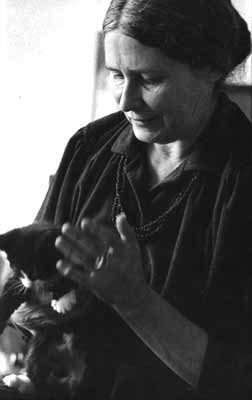
Doris Lessing and Cat
Excerpts from On Cats by Doris Lessing:
“After a certain age-and for some of us that can be very young—there are no new people, beasts, dreams, faces, events: it has all happened before, they have appeared before, masked differently, wearing different clothes, another nationality, another colour; but the same, the same, and everything is an echo and a repetition; and there is no grief even that it is not a recurrence of something long out of memory that expresses itself in unbelievable anguish, days of tears, loneliness, knowledge of betrayal and all for a small, thin, dying cat.
I was sick that winter. It was inconvenient because my big room was due to be whitewashed. I was put in the little room at the end of the house….The cat, a bluish-grey Persian, arrived purring on my bed, and settled down to share my sickness, my food, my pillow, my sleep. When I woke in the mornings, my face turned to half-frozen linen; the outside of the fur blanket on the bed was cold; the smell of fresh whitewash from next door was cold and antiseptic; the wind lifting and laying the dust outside the door was cold—but in the crook of my arm, a light purring warmth, the cat, my friend….Through the months of the dry season the only water for the garden was the dirty bathwater. The cat fell into this tub when it was full of hot water. She screamed, was pulled out into a chill wind, washed in permaganate, for the tub was filthy and held leaves and dust as well as soapy water, was dried, and put into my bed to warm. But she sneezed and wheezed and then grew burning hot with fever. She had pneumonia. We dosed her with what there was in the house, but that was before antibiotics, and so she died. For a week she lay in my arms purring, purring, in a rough trembling hoarse little voice that became weaker, then was silent; licked my hand; opened enormous green eyes when I called her name and besought her to live; closed them, died………”
“That was it. Never again. And for years I matched cats in friends’ houses, cats in shops, cats on farms, cats in the street, cats on walls, cats in memory, with that gentle blue grey purring creature which for me was the cat, the Cat, never to be replaced.”
It was only after 25 years that Lessing was able to own another cat.
“My cat was a half-grown black-and-white female of undistinguished origin, guaranteed to be clean and amenable. She was a nice enough beast, but I did not love her; never succumbed; was, in short, protecting myself. I thought her neurotic, overanxious, fussy; but that was unfair, because a town cat’s ife is so unnatural that it never learns the independence a farm cat has. I was bothered because she waited for people to come home—like a dog; must be in the same room and be paid attention—like a dog; must have human attendance when she had kittens. As for her food habits, she won that battle in the first week. She never, not once, ate anything but lightly cooked calves’ liver, and lightly boiled whiting. Where did she get these tastes? I demanded of her ex-owner, who of course did not know. I put down tinned food for her, and scraps from the table; but it wasn’t until we were eating liver that she showed interest. Liver it was to be. And she would not eat liver cooked in anything but butter.”
“The kitten was six weeks old. It was enchanting, a delicate fairy-tale cat, whose Siamese genes showed in the shape of the face, ears, tail, and the subtle lines of its body. Her back was tabby: from above or the back, she was a pretty tabby kitten, in grey and cream. But her front and stomach were a smoky-gold, Siamese cream, with half bars of black at the neck. Her face was pencilled with black-fine dark rings around the eyes, fine dark streaks on her cheeks, a tiny cream-colored nose with a pink tip, outlined in black. From the front, sitting with her slender paws straight, she was an exotically beautiful beast. She sat, a tiny thing, in the middle of a yellow carpet, surrounded by five worshippers, not at all afraid of us. Then she stalked around that floor of the house, inspecting every inch of it, climbed up on to my bed, crept under the fold of a sheet, and was at home.”
“And she was so beautiful—really so very beautiful.
She was the best sitting on the bed looking out. Her two creamy lightly barred front legs were straight down side by side, on two silvery paws. Her ears, lightly fringed with white that looked silver, lifted and moved, back, forward, listening and sensing. Her face turned, slightly, after each new sensation, alert. Her tail moved, in another dimension, as if its tip was catching messages her other organs could not. She sat poised, air-light, looking, hearing, feeling, smelling, breathing, with all of her, fur, whiskers, ears—everything, in delicate vibration. If a fish is the movement of water embodied, given shape, then cat is a diagram and pattern of subtle air.”
“When he was a young cat I would wake to find him awake and then, seeing that I was, he would walk up the bed, lie down on my shoulder, put his paws around my neck, lay his furry cheek against my cheek, and give that deep sigh of content you hear from a child when he is at last lifted up into loving arms. And I heard myself sigh in response. Then he purred and purred, until he was asleep in my arms.
“What luxury a cat is, the moments of shocking and startling pleasure in a day, the feel of the beast, the soft sleekness under your palm, the warmth when you wake on a cold night, the grace and charm even in a quite ordinary workaday puss. Cat walks across your room, and in that lonely stalk you see leopard or even panther, or it turns its head to acknowledge you and the yellow blaze of those eyes tells you what an exotic visitor you have here, in this household friend, the cat who purrs as you stroke, or rub his chin, or scratch his head.”
For more on Doris Lessing, see our post on Cats in 20th Century Literature.
The post Cat Stories – On Cats by Doris Lessing appeared first on THE GREAT CAT.
April 8, 2016
Cat Stories – Steer Wrestling, James A. Murtha
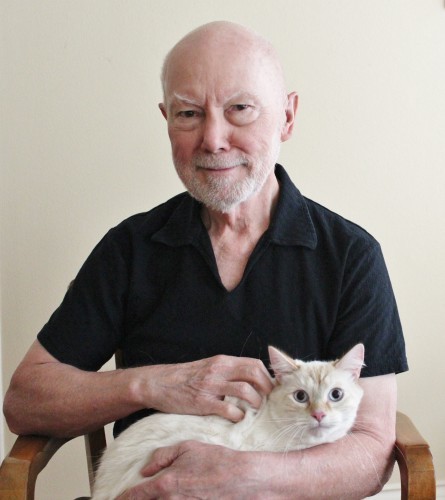
Jim and Snowball
Here is an excerpt from The Adventures of Kalamazoo recently published by James A. Murtha, a cat lover. If you’d like to read more of his stories, click here to visit his website.
One Sunday afternoon, Kalamazoo and I channel-surfed from the couch, for me a mindless respite from the classroom and for him a break from crouching on the deck in tiresome surveillance of squirrels and birds. We happened on a rodeo and got caught up in the interplay between man and beast, hooves thudding, horses and bulls snorting, flailing-armed cowboys defying gravity. He sat up on his cushion, tail twitching, ears pricked.
Yet, as the events rolled by, the cowboys proved to be mediocre: the bronco riders never lasting long, the bull riders averse to digging in their spurs, and the steer wrestlers inept at forcing their animals to the ground—like Hollywood actors more than the real thing. Mooze returned to washing behind his ears and I reached for the remote.
I’m not sure which of us started the snide remarks, but when I said, “Mooze, I can ride and rope and wrestle as well as those jokers,” he was quick to agree.
“You took the words out of my mouth, Jimbo.”
I went on to say that it might be fun to try that steer wrestling right here in the apartment. Mooze gave me one of his sidelong glances and yawned. I took that gesture as a subtle challenge. He thought he had me pegged as a talker rather than a doer. I’d show him. Instead of our usual games involving a flashlight or balls, we verged on a more sophisticated brand of play.
Over the past year we’d grown more co-dependent, each still in a funk from the loss of a significant other. I hadn’t had to deal with death, only divorce, but Mooze had lost Della, his Siamese buddy ever since they arrived from the animal shelter six years before. In case you’re wondering about these names, they came from a line in a Hoyt Axton song, “Della and the dealer and a dog named Jake and a cat named Kalamazoo.”
A brief argument ensued about who should be the cowboy. Much as I hated to use the line of reasoning, I convinced him that I simply would not make a good steer since I’d have to fake the four legs by crawling about, and I simply couldn’t buck my rear end properly. He was most disappointed because, as the steer, he wouldn’t require a costume. This cat truly loved to dress up. Another time he wore a red bandana for days after we watched The Cowboy.
So as not to hurt his feelings, I prepared for the game by dressing minimally—jeans, a plaid shirt, an old straw cowboy hat, and boots. I knew the boots would set him off, but how could I be a cowboy without boots? I avoided the bandana and, of course, wore no spurs. We fashioned a pen out of a cardboard box, setting it on its side and using the top flap for a gate. He got in and I closed the lid then climbed up on the sofa, holding one end of the string that we had attached to the gate.
I made like an announcer. “Ladies and gentlemen, welcome to the annual El Paso Rodeo.”
The steer broke character long enough to sing the first two lines of his favorite Marty Robbins song.
I cleared my throat. “Our next contestant, appearing here for the first time, is Rusty Hawkins from Mesquite, Texas.”
Mooze wrinkled his nose. “You made up that town name, right, Jimbo? I like the sound of it.”
“Enough of this palaver,” I said. “We’re ready for action.”
I pulled open the gate. Mooze bounded out and charged along the sofa. When he got within range, I sprung down toward the little steer. My momentum landed me leaning forward rather than backwards like they do on TV, so I couldn’t dig in my heels. I ended up in a crouch looking, I’m sure, something like a frog. I reached over and grabbed Mooze by the ears and proceeded to wrench his neck until his chin pointed toward the ceiling.
This was one time I wished I’d had his rear claws removed. He evidently thought I’d been too rough on his ears, so he easily escaped my grasp, nipped my hand, and rolled over to start those hind legs pedaling against my forearm.
“Mooze, stop. Please.”
He glared at me, shook off the discomfort in his ears, and licked the imaginary wound on his left foreleg. Momentarily, we commenced to laugh and decided to give it another try. I promised that if we got it down right, I’d let him be the cowboy.
Mooze returned to the pen and waited till I had the gate secured and was back on the couch, knees bent, gate rope in hand. I sped through the announcer’s preamble and yanked the rope. Mooze came out flying. He was giving it all he could. I took aim and lurched forward, again losing my balance, but managed to latch onto the scruff of his neck on the way down. Mooze jerked his head back and forth a few times real authentic-like. I leaned back on my rear with my boot heels dug into the carpet and tucked his head under my arm as I simulated a twisting motion. He let out a mean meow because I’d caught his tail under my right elbow. We kept going, him jerking and bucking in spite of the fact that I had his neck twisted into an uncomfortable position. Finally, he succumbed gracefully. I leaped to my feet, brushed dust from my imaginary chaps, and tipped my hat to the roar of the crowd, all the while moving toward the safety of the couch.
Mooze licked a couple of wounds this time and said nothing for a spell. Then he did a truly amazing thing for a cat: he applauded my effort. It must have been hard for him to congratulate me. Cats take so much physical skill for granted that they hardly ever think humans do anything remarkable. Anyhow, I was caught off guard and didn’t know what to say except that I was impressed with his performance and his courage and his trust in me. It was one of those times where I’d wished I’d said something first, because it sounded like I was just repaying the compliment. We stopped just short of getting maudlin about it, realizing how funny we must have looked and went from serious to grins to belly laughs in no time.
We should have quit while we were ahead, but we went on with the spoof, this time changing roles. Mooze wandered off to his room and took the longest time in preparation, while I put away my hat and boots. I left the shirt on since it was sweaty anyhow. I was about to call him when I heard a slurred, “Buenas tardes, amigo.”
He made his entrance in style, sashaying into the living room wearing the fanciest boots I’d ever seen on a cat—blackened armadillo, mind you. His little ears poked through a tiny black Stetson. Chaps with more studs than a rock star protected his rear legs. A black silk bandana circled his neck. He must have practiced the bow-legged walk, because he had it down pat, and I mean pat.
He knew he was the cat’s meow—one of those phrases he detests. His hat was cocked so low I couldn’t see that he was grinning, but I knew he was from the way he pranced about. We tipped up that box so I could stand inside it, and he grabbed the string with his mouth as he leaped up onto the couch. He nodded meaningfully toward me, and I commenced to snort and tramp and kick the sides of the box as he strutted back and forth on the cushions, milking the introductions for all they were worth.
“Ladies and gentlemen, our final contestant is a crowd favorite from south of the border, Jose Garcia Alvarez, better known in his homeland as El Sombrero Negro.”
I could hardly wait till the introductions were over. When Mooze yanked that cord, I hopped out of the pen and went down on all fours. As I scampered past the sofa, I saw a blur out of the corner of my eye. Mooze lit on my shoulders and wrapped his forelegs about my head, covering my eyes in the process. Then he slid off to one side and twisted my head around enough to catch my undivided attention. I rolled over onto my side to relieve the discomfort. In a flash, Mooze hopped off of me, removed his hat, and waved it to the crowd, while I lay there, stunned. I started to tell him that he wasn’t playing fair, but I recalled the last argument about fair play and bit my tongue, unwilling to hear his lecture on the role of play in everyday life. I regained my composure and saluted him, assuring him that he was just about as good a steer wrestler as I’d ever laid eyes on. He was kind and didn’t tell me I had been a great steer.
We haven’t played the game since, and I doubt we will. We remain good buddies, but just don’t talk about steer wrestling. Fortunately, we haven’t watched any more rodeos on TV either. Every once in a while, I catch Mooze in his El Sombrero Negro outfit, however, parading back and forth in front of the bedroom mirror and pausing to bow, hat in forepaw. And I can tell by the looks I get when I walk up the front steps that he has told the story to every cat on the block. Worst of all, I think Mooze is putting it down on paper. I’ve seen letters from publishers to Mooze and I’ve heard a muffled tapping on his keyboard late at night. I don’t really object to that either. I just hope he’s as kind to me as I am to him.
Want to read more of these cat stories, then follow this link to purchase on Amazon.
The post Cat Stories – Steer Wrestling, James A. Murtha appeared first on THE GREAT CAT.
March 2, 2016
The Philanthropist and the Happy Cat, H.H. Munro (Saki)
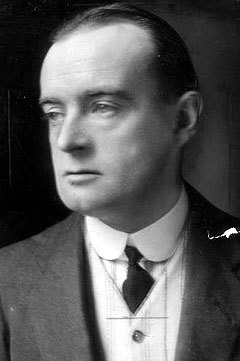 H.H. Munro, or Saki (his penname) (1870-1916, British) was a great lover of cats as many literary talents have been and are. He wrote two other short stories regarding cats: Tobermory and The Achievement of the Cat. We’ll leave those for other posts. Here he equates the cat, Attab, with Jocantha the main female character. Not a new idea really, but an interesting read.
H.H. Munro, or Saki (his penname) (1870-1916, British) was a great lover of cats as many literary talents have been and are. He wrote two other short stories regarding cats: Tobermory and The Achievement of the Cat. We’ll leave those for other posts. Here he equates the cat, Attab, with Jocantha the main female character. Not a new idea really, but an interesting read.
THE PHILANTHROPIST AND THE HAPPY CAT
Jocantha Bessbury was in the mood to be serenely and graciously happy. Her world was a pleasant place, and it was wearing one of its pleasantest aspects. Gregory had managed to get home for a hurried lunch and a smoke afterwards in the little snuggery; the lunch had been a good one, and there was just time to do justice to the coffee and cigarettes. Both were excellent in their way, and Gregory was, in his way, an excellent husband. Jocantha rather suspected herself of making him a very charming wife, and more than suspected herself of having a first-rate dressmaker.
“I don’t suppose a more thoroughly contented personality is to be found in all Chelsea,” observed Jocantha in allusion to herself; “except perhaps Attab,” she continued, glancing towards the large tabby-marked cat that lay in considerable ease in a corner of the divan. “He lies there, purring and dreaming, shifting his limbs now and then in an ecstasy of cushioned comfort. He seems the incarnation of everything soft and silky and velvety, without a sharp edge in his composition, a dreamer whose philosophy is sleep and let sleep; and then, as evening draws on, he goes out into the garden with a red glint in his eyes and slays a drowsy sparrow.”
“As every pair of sparrows hatches out ten or more young ones in the year, while their food supply remains stationary, it is just as well that the Attabs of the community should have that idea of how to pass an amusing afternoon,” said Gregory. Having delivered himself of this sage comment he lit another cigarette, bade Jocantha a playfully affectionate good-bye, and departed into the outer world.
“Remember, dinner’s a wee bit earlier to-night, as we’re going to the Haymarket,” she called after him.
Left to herself, Jocantha continued the process of looking at her life with placid, introspective eyes. If she had not everything she wanted in this world, at least she was very well pleased with what she had got. She was very well pleased, for instance, with the snuggery, which contrived somehow to be cosy and dainty and expensive all at once. The porcelain was rare and beautiful, the Chinese enamels took on wonderful tints in the firelight, the rugs and hangings led the eye through sumptuous harmonies of colouring. It was a room in which one might have suitably entertained an ambassador or an archbishop, but it was also a room in which one could cut out pictures for a scrap-book without feeling that one was scandalising the deities of the place with one’s litter. And as with the snuggery, so with the rest of the house, and as with the house, so with the other departments of Jocantha’s life; she really had good reason for being one of the most contented women in Chelsea.
From being in a mood of simmering satisfaction with her lot she passed to the phase of being generously commiserating for those thousands around her whose lives and circumstances were dull, cheap, pleasureless, and empty. Work girls, shop assistants and so forth, the class that have neither the happy-go-lucky freedom of the poor nor the leisured freedom of the rich, came specially within the range of her sympathy. It was sad to think that there were young people who, after a long day’s work, had to sit alone in chill, dreary bedrooms because they could not afford the price of a cup of coffee and a sandwich in a restaurant, still less a shilling for a theatre gallery.
Jocantha’s mind was still dwelling on this theme when she started forth on an afternoon campaign of desultory shopping; it would be rather a comforting thing, she told herself, if she could do something, on the spur of the moment, to bring a gleam of pleasure and interest into the life of even one or two wistful- hearted, empty-pocketed workers; it would add a good deal to her sense of enjoyment at the theatre that night. She would get two upper circle tickets for a popular play, make her way into some cheap tea-shop, and present the tickets to the first couple of interesting work girls with whom she could casually drop into conversation. She could explain matters by saying that she was unable to use the tickets herself and did not want them to be wasted, and, on the other hand, did not want the trouble of sending them back. On further reflection she decided that it might be better to get only one ticket and give it to some lonely-looking girl sitting eating her frugal meal by herself; the girl might scrape acquaintance with her next-seat neighbour at the theatre and lay the foundations of a lasting friendship.
With the Fairy Godmother impulse strong upon her, Jocantha marched into a ticket agency and selected with immense care an upper circle seat for the “Yellow Peacock,” a play that was attracting a considerable amount of discussion and criticism. Then she went forth in search of a tea-shop and philanthropic adventure, at about the same time that Attab sauntered into the garden with a mind attuned to sparrow stalking. In a corner of an A.B.C. shop she found an unoccupied table, whereat she promptly installed herself, impelled by the fact that at the next table was sitting a young girl, rather plain of feature, with tired, listless eyes, and a general air of uncomplaining forlornness. Her dress was of poor material, but aimed at being in the fashion, her hair was pretty, and her complexion bad; she was finishing a modest meal of tea and scone, and she was not very different in her way from thousands of other girls who were finishing, or beginning, or continuing their teas in London tea-shops at that exact moment. The odds were enormously in favour of the supposition that she had never seen the “Yellow Peacock”; obviously she supplied excellent material for Jocantha’s first experiment in haphazard benefaction.
Jocantha ordered some tea and a muffin, and then turned a friendly scrutiny on her neighbour with a view to catching her eye. At that precise moment the girl’s face lit up with sudden pleasure, her eyes sparkled, a flush came into her cheeks, and she looked almost pretty. A young man, whom she greeted with an affectionate “Hullo, Bertie,” came up to her table and took his seat in a chair facing her. Jocantha looked hard at the new- comer; he was in appearance a few years younger than herself, very much better looking than Gregory, rather better looking, in fact, than any of the young men of her set. She guessed him to be a well-mannered young clerk in some wholesale warehouse, existing and amusing himself as best he might on a tiny salary, and commanding a holiday of about two weeks in the year. He was aware, of course, of his good looks, but with the shy self- consciousness of the Anglo-Saxon, not the blatant complacency of the Latin or Semite. He was obviously on terms of friendly intimacy with the girl he was talking to, probably they were drifting towards a formal engagement. Jocantha pictured the boy’s home, in a rather narrow circle, with a tiresome mother who always wanted to know how and where he spent his evenings. He would exchange that humdrum thraldom in due course for a home of his own, dominated by a chronic scarcity of pounds, shillings, and pence, and a dearth of most of the things that made life attractive or comfortable. Jocantha felt extremely sorry for him. She wondered if he had seen the “Yellow Peacock”; the odds were enormously in favour of the supposition that he had not. The girl had finished her tea and would shortly be going back to her work; when the boy was alone it would be quite easy for Jocantha to say: “My husband has made other arrangements for me this evening; would you care to make use of this ticket, which would otherwise be wasted?” Then she could come there again one afternoon for tea, and, if she saw him, ask him how he liked the play. If he was a nice boy and improved on acquaintance he could be given more theatre tickets, and perhaps asked to come one Sunday to tea at Chelsea. Jocantha made up her mind that he would improve on acquaintance, and that Gregory would like him, and that the Fairy Godmother business would prove far more entertaining than she had originally anticipated. The boy was distinctly presentable; he knew how to brush his hair, which was possibly an imitative faculty; he knew what colour of tie suited him, which might be intuition; he was exactly the type that Jocantha admired, which of course was accident. Altogether she was rather pleased when the girl looked at the clock and bade a friendly but hurried farewell to her companion. Bertie nodded “good-bye,” gulped down a mouthful of tea, and then produced from his overcoat pocket a paper-covered book, bearing the title “Sepoy and Sahib, a tale of the great Mutiny.”
The laws of tea-shop etiquette forbid that you should offer theatre tickets to a stranger without having first caught the stranger’s eye. It is even better if you can ask to have a sugar basin passed to you, having previously concealed the fact that you have a large and well-filled sugar basin on your own table; this is not difficult to manage, as the printed menu is generally nearly as large as the table, and can be made to stand on end. Jocantha set to work hopefully; she had a long and rather high-pitched discussion with the waitress concerning alleged defects in an altogether blameless muffin, she made loud and plaintive inquiries about the tube service to some impossibly remote suburb, she talked with brilliant insincerity to the tea-shop kitten, and as a last resort she upset a milk-jug and swore at it daintily. Altogether she attracted a good deal of attention, but never for a moment did she attract the attention of the boy with the beautifully-brushed hair, who was some thousands of miles away in the baking plains of Hindostan, amid deserted bungalows, seething bazaars, and riotous barrack squares, listening to the throbbing of tom-toms and the distant rattle of musketry.
Jocantha went back to her house in Chelsea, which struck her for the first time as looking dull and over- furnished. She had a resentful conviction that Gregory would be uninteresting at dinner, and that the play would be stupid after dinner. On the whole her frame of mind showed a marked divergence from the purring complacency of Attab, who was again curled up in his corner of the divan with a great peace radiating from every curve of his body.
But then he had killed his sparrow.
The post The Philanthropist and the Happy Cat, H.H. Munro (Saki) appeared first on THE GREAT CAT.

